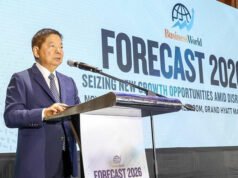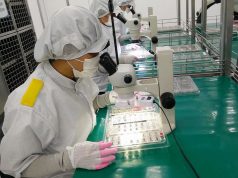Flood probe clouds growth outlook

By Katherine K. Chan
THE PHILIPPINES’ economic expansion is set to fall short of official targets through 2026 as a widening graft investigation into flood control projects weighs on public spending and investor confidence, according to Deutsche Bank Research.
“The graft probe has weighed on sentiment onshore and will likely drag growth below potential over the coming quarters as it continues to evolve,” Deutsche Bank economist Junjie Huang said in a Nov. 22 report.
Heightened caution among public officials could lead to uneven disbursements even as President Ferdinand R. Marcos, Jr. confirmed that unused infrastructure funds would be reallocated to priority sectors such as health and education, he added.
Deutsche Bank Research lowered its gross domestic product (GDP) growth forecast for next year to 5.1% from 5.7%, below the government’s 6-7% goal. “The Philippines is expected to see a modest growth recovery to 5.1%, as private demand makes up for softer public spending.”
It cut its 2025 projection to 4.7% from 5.4%, signaling a marked slowdown from last year’s 5.7% expansion.
In the third quarter, the Philippine economy grew 4%, the slowest in more than four years, as the widening corruption probe curtailed government spending and dampened household consumption.
The uncertainty surrounding fiscal policy has intensified as the government navigates the scandal. Deutsche Bank Research expects the budget deficit to settle at 5.4% of GDP in 2025 and 2026.
“With investigations into corruption still ongoing and the recent Cabinet reshuffle, spending plans could change over (November to December),” Mr. Huang said. The administration has reiterated that funds unspent on infrastructure would be redirected to sectors deemed critical, including health and education.
The subdued growth outlook coupled with low inflation may encourage further monetary easing.
Mr. Huang projects the Bangko Sentral ng Pilipinas (BSP) will cut the key policy rate by 25 basis points in December and again in February, bringing the benchmark to 4.25%, while leaving the door open for additional reductions if the output gap widens.
The BSP has trimmed rates by 175 bps since August 2024, with the most recent 25-bp cut in October lowering borrowing costs to 4.75% — the lowest in over three years. The central bank’s final rate-setting meeting for 2025 is scheduled for Dec. 11.
Government interventions in the rice market may also help stabilize inflation. Mr. Huang forecasts headline inflation at 1.7% this year, before rising to 2.9% next year, within the BSP’s 2-4% target.
Measures include a nationwide 60-day price freeze on essentials, adjustments to rice import tariffs linked to global prices and a suspension of regular rice imports until the end of the year. The administration plans an import window in January and a tariff scheme for 2026 with rates ranging from 15% to 35%.
Foreign direct investment (FDI) inflows are under pressure as the scandal sours sentiment. Fitch Solutions unit BMI said corruption concerns, combined with global trade uncertainty, are likely to constrain FDI next year.
FDI as a share of GDP fell to 1.3% in the second quarter, below the 2.5% pre-pandemic average. In August, net inflows dropped 40.5% year on year to $494 million, the lowest since June.
The peso has weakened alongside declining investor confidence. It closed at P58.91 a dollar on Tuesday, down four centavos from the previous session. BMI forecasts the peso at P59 by yearend, with a possible breach of P59.50 in 2026, reflecting expectations of further BSP rate cuts.
“The corruption scandal will dampen foreign direct investment inflows into 2026, adding to pressures from macroeconomic uncertainty and global trade tensions,” BMI said in a report dated Nov. 24.
“Further depreciatory pressures lie ahead as we expect Bangko Sentral ng Pilipinas to cut rates by 25 bps in its December meeting following slower growth in (the third quarter) — bringing the US-Philippine policy rate differential back to the narrowest at 50 bps,” it added.
Meanwhile, SUN Life Investment Management and Trust Corp. expects the Philippine economy to grow 4% to 5% next year as governance and corruption issues cloud the outlook.
“Our prediction is probably, we’ll have to ride this in the next three quarters before we can really see any significant movement or change in direction for the overall economy,” SunLife President Michael Gerard D. Enriquez told reporters late on Monday.
“Does this mean that investments will let go? Not necessarily, but I think it will just be slow and stagnant compared with what we usually expect,” he added.
Weak investor sentiment has also weighed on the local equity market, resulting in a weaker valuation on the company’s assets under management, Mr. Enriquez said.
Sunlife sees the Philippine Stock Exchange index (PSEi) ending the year at the 6,000 level.
The PSEi fell 0.75% or 45.42 points to close at 5,976.17, while the broader all-share index rose 1.12% or 39.64 points to 3,574.82.
Mr. Enriquez said their managed assets were revalued at P425 billion from P430 billion due to the PSEi’s losses.
“It would have been better but there’s a market revaluation on equities,” he said. “So, it went down because the equity market went down.” — with AMCS



